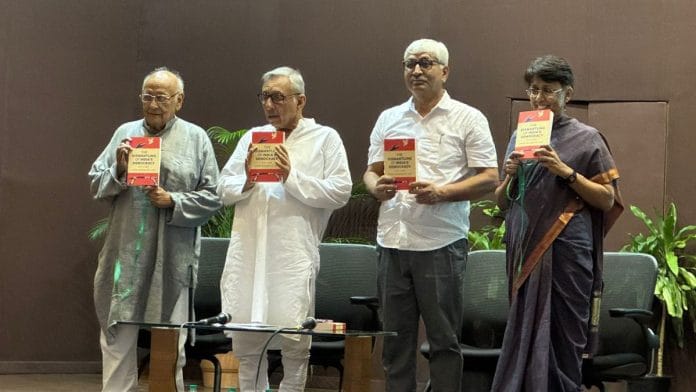Delhi: The BJP’s rise to power stemmed from a nexus between small businessmen and politicians that emerged in the 1990s and first backed the Congress, according to Mani Shankar Aiyar.
“This localised nexus shifted loyalties to the most anti-Congress party they could find—the Bharatiya Janata Party, the political arm of the communal Hindutva forces,” he said.
The Congressman and former civil servant was speaking at the launch of The Dismantling of India’s Democracy: 1947-2025 by senior journalist Prem Shankar Jha. Three panellists had gathered at Jawahar Bhawan on Tuesday to analyse the issues threadbare: former Union minister Aiyar, Delhi School of Economics professor Nandini Sundar and the author himself. The session was moderated by Delhi University professor and writer Apoorvanand.
Ravi Singh, publisher and co-founder of Speaking Tiger, introduced the book.
“To cure a sickness, it is important to name it, to see it clearly for what it is and then to understand the causes. In this book, Prem states clearly that what we are witnessing today is the growth — and increasingly brazen, even desperate, attempts — to consolidate a distinctively Indian form of fascism,” he said.
The book argues that India’s hard-won democracy, once rooted in diversity and tolerance, has been hollowed out. This started in the early years after Independence, according to Jha— slowly at first and then with “determined ferocity” after 2014.
Also Read: The Untold Kargil Story—100 Bofors guns, satellite phones, and ‘did Musharraf tell Sharif?’
Democratic disagreement
It took Jha nine years of aggressive research to write the book. For Nandini Sundar, it was not just another treatise on democracy and post-Modi India, but one that ranged far wider — from the birth of the Constitution to election financing and the role of business in politics.
However, while Sundar acknowledged the book’s breadth in taking on the making and unmaking of democratic India, she did not agree with all its contentions.
Her first disagreement was over calling India a liberal democracy.
“I think one could argue that, contrary to the usual idea, India has always been an illiberal democracy. If you look at the Armed Forces Special Powers Act, that has been operational since 1948, if you look at what’s happening in Kashmir, the militarisation, the bombing of Mizoram in the 60s… this has not been a shining democracy,” said Sundar.
Her other critique was of the author’s emphasis on small businesses rather than the role of massive conglomerates in defining the politics of the day.
Also Read: ‘Covid was an opportunity’—book launch on India’s pandemic fight draws many govt officials
Counting the votes
Amid the wider discussion of fascism and democracy, Aiyar spoke for 40 minutes on a narrower point — the BJP’s vote share.
He noted that the party had won only about one-third of the votes cast in the three successive general elections of 2014, 2019 and 2024.
“In other words, some two-thirds of Indians have never voted for the BJP, which means that at least half of all Hindus have consistently rejected any equivalence between the political posture of Hindutva and Hinduism as a religion or way of life,” Aiyar said with a smirk, as the audience broke into a round of applause. Jha nodded his head in agreement and Sundar smiled.
Being a veteran Congress leader, and speaking at Jawahar Bhawan, Aiyar couldn’t hold back his enthusiasm.
“So, going by that, the INDIA alliance might yet prevail, and there may not be an Indian Aragalaya,” he said, referring to the 2022 mass protests in Colombo.
(Edited by Asavari Singh)






